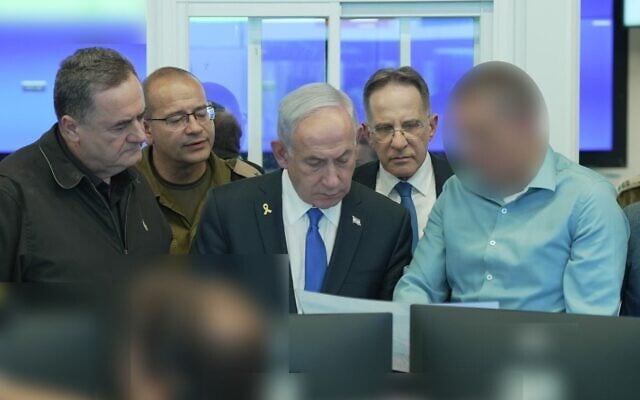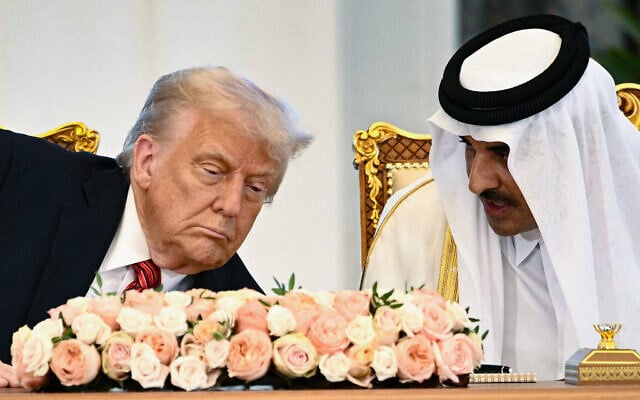


This Editor’s Note was sent out earlier Wednesday in ToI’s weekly update email to members of the Times of Israel Community. To receive these Editor’s Notes as they’re released, join the ToI Community here.
The assumption, as news broke on Tuesday afternoon that Israel had targeted the Hamas leadership in Qatar, was that the attack had been closely coordinated with US President Donald Trump.
And the assumption was understandable. For one thing, given that the US maintains its biggest military base in the region in Qatar, among other relevant assets, there was no way that Israel could have carried out the strike without the US seeing it coming and even potentially scrambling to head it off.
For another, Trump had issued an ultimatum to Hamas on Sunday: “Everyone wants the hostages HOME. Everyone wants this war to end!” he wrote on Truth Social. “It is time for Hamas to accept [my terms] as well. I have warned Hamas about the consequences of not accepting. This is my last warning. There will not be another one.”
Still, there was room for some doubt. Trump had only entered Israel’s 12-day war on Iran after 11 days, and then swiftly brought it to a halt. And this was Qatar, a US ally, not Iran, a US enemy. A country mediating indirect Israeli-Hamas talks, alongside the US and Egypt, in an effort to facilitate the repeated Trump demand for the release of all the hostages and the end of the war in Gaza. (Asked by The Times of Israel, as he hosted Prime Minister Benjamin Netanyahu at the Oval Office in February, whether Qatar, which he had previously described as a funder of terrorism, was now part of the problem or of the solution, the president was unequivocal: “Qatar is absolutely trying to help. I know them very well, and they’re doing everything they can.”)
And very quickly, the first tangible hint that this may not have been a Trump-sanctioned Israeli strike came with an English-language statement issued by the Prime Minister’s Office: “Today’s action against the top terrorist chieftains of Hamas was a wholly independent Israeli operation,” Netanyahu’s office said. “Israel initiated it, Israel conducted it, and Israel takes full responsibility.”
Was this a case of Israel, somewhat atypically, rushing to claim solo credit for an attack it was certain had succeeded, rather than waiting (as was the case, for instance, with the assassination of Hezbollah’s Hassan Nasrallah) to definitively ascertain the result? Or was Netanyahu moving hurriedly to explicitly dissociate Trump from an attack on a US ally whose sovereignty Israel had violated, as a minimal courtesy to a president he had blindsided?
As the hours went by, while some Hebrew media reports asserted that Israel had tipped off the US, albeit extremely belatedly, the US administration moved to clarify that this was not the case. And then Trump himself stated that he had found out about the strike from the US military, and indicated that he had sought to thwart it. He said he instructed special envoy Steve Witkoff to convey the news of the imminent strike to the Qataris — “which he did, however, unfortunately, too late to stop the attack.”
As of this writing, there are many more questions than answers regarding the events as they have been presented as unfolding, including: Did Trump contact Netanyahu, or try and fail to do so, in order to urge him to call off the strike — as he memorably did as the Israel-Iran ceasefire came into effect on June 24? If he didn’t try to reach Netanyahu, why not? Did word of the strike leak, enabling others to tip off Qatar? Did Qatar tip off Hamas?
More centrally, as of this writing, the results of the strike, which targeted most of the key leadership of Hamas “in exile,” are not clear. Military sources exuded optimism in the first hours after 10 or more Israeli planes dropped precision munitions on the specific part of the building in Doha where the Hamas leadership was said to have been meeting. By Wednesday morning, the mood had shifted to growing pessimism, with those ostensibly in the know vouchsafing that there was, to date, no evidence that the key targets had been killed.
“If we didn’t get them this time, we’ll get them the next time,” Israel’s Ambassador to the US Yechiel Leiter told Fox News overnight, in what might have been construed as an acknowledgment that things had not turned out as expected.
As confirmed by Israeli officials, the attack had been months in the planning. As stated by Netanyahu, the “operational opportunity” was identified at noon on Tuesday and the green light given — a day after two terrorists killed six Israelis in an attack in Jerusalem subsequently claimed by Hamas.
“The prime minister and defense minister believed the operation was fully justified,” Netanyahu said in a joint statement with Defense Minister Israel Katz, “given that this Hamas leadership was the one that initiated and organized the October 7 massacre, and has since continued to carry out murderous attacks against Israel and its citizens, including taking responsibility for the murder of our civilians in yesterday’s attack in Jerusalem.”
In remarks delivered at a US Embassy event on Tuesday evening, Netanyahu specified that “the days are over when terror leaders will enjoy immunity in a particular place.”
He also asserted that the strike could “open the door to the end of the war in Gaza.” He said Israel had accepted what he described as Trump’s proposal to end the war, “beginning with the immediate release of all our hostages,” and that if unnamed others did so too, “the war can end immediately” and “we can begin once again to pursue the expansion of peace in our region for the benefit of all.”
That might possibly hold — if the targets were indeed eliminated, and Hamas significantly weakened or deterred. In that case, the strike could provide Netanyahu with a potential victory moment — a turning point to justify defying his far-right coalition partners, prioritizing the release of the hostages over continuing the war, and elevating his support among the Israeli public higher than he has managed since October 7.
But if the targets survived the attack or had left the building — perhaps tipped off on the day or, as is also being reported, some time ahead by Egypt, Turkey or another source — all the calculations change.
The men whom Israel set out to kill — including Khalil al-Hayya, the head of Hamas’s operations in Gaza and the public face of its leadership; former Hamas chief Khaled Mashaal, and Zaher Jabarin, its West Bank terror orchestrator — are indeed, as Netanyahu stated, among those who planned and celebrated the slaughter of Israelis on October 7, 2023, and are indeed determined to achieve the destruction of Israel. Legitimate targets by any standard.
But getting them “the next time” will be a much more complicated feat — not because they will suddenly be aware that they are in Israel’s sights; they would never have doubted that — but because for the foreseeable future they actually would have “immunity in a particular place”: Qatar.
Trump is publicly “very unhappy” with Israel — endorsing the elimination of Hamas as “a worthy goal” but fuming over “the location of the attack.”
Qatar, a strong US friend, said Trump late Tuesday, had been “working very hard and bravely taking risks with us to broker peace.” As such, the attack there “does not advance Israel or America’s goals.” And, therefore, he assured the leaders of Qatar “that such a thing will not happen again on their soil.”
As far as we know right now, then, Netanyahu kept Trump in the dark about an attack on a deeply problematic regional player. Widely seen in Israel as stooging for Hamas and inciting extremism across the Arab world and beyond via Al Jazeera, it is nevertheless regarded by Trump as an ally — so central an ally, in fact, that he went there in May on his first Middle East trip since regaining the presidency, but did not visit Israel.
The attack may not have succeeded. Its targets have essentially been promised US presidential protection in Qatar. And so Netanyahu would have to flatly defy Israel’s most important and almost sole remaining ally to hit them again.
The truism has it that all the world loves a winner. In this case, it’s even accurate as regards the multitude of Arab states — notably including Egypt, Jordan, the UAE and Saudi Arabia — that rushed to condemn Israel soon after the strike. They and others in the region have direct reasons to want Hamas quashed.
But the obverse cliche is that failure is an orphan. And for an Israel already widely loathed globally under Netanyahu, any and every failure and perceived vulnerability carries deeply harmful potential consequences.
“There is no greater victory than this,” exulted retired general Yisrael Ziv, an October 7 hero and a major critic of Netanyahu, in the heady first hours after the strike, when it was widely believed that the Hamas leadership had been wiped out.
And how great a defeat if it turns out that they haven’t? With what repercussions — for ties with the US, for Israel globally and regionally, for the war against an ideologically intransigent Hamas, and, not least, for the hostages Hamas holds in Gaza?



